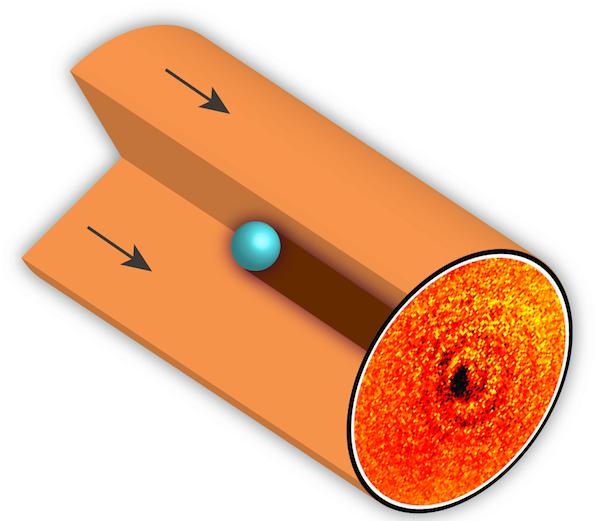Scientists Take First Picture of a Single Atom
While the purpose of the picture was to show how many atoms it would take to produce a shadow, the team was also able to hold the atom long enough in one place to take the picture and capture its shadow using a specific frequency of light as well as a super high-resolution microscope.
Dave Kielpinski, who led the research project at Griffith University's Centre for Quantum Dynamics in Brisbane, Australia, said that they trapped a ytterbium atom in a chamber and held it with electrical forces. Then they exposed it to light and aimed its shadow onto a detector. Key to the picture was the light frequency.
"If we change the frequency of the light we shine on the atom by just one part in a billion, the image can no longer be seen," Kielpinski said. "Because we are able to predict how dark a single atom should be, as in how much light it should absorb in forming a shadow, we can measure if the microscope is achieving the maximum contrast allowed by physics."
As a result of the research, scientists say it is now possible to predict "how much light is needed to observe processes within cells, under optimum microscopy conditions, without crossing the threshold and destroying them." Microbiologists in particular may benefit from the findings as they will be able to take a much closer look at tiny structures, such as DNA strands, without exposing them to light that could harm them.
Get Tom's Hardware's best news and in-depth reviews, straight to your inbox.

Douglas Perry was a freelance writer for Tom's Hardware covering semiconductors, storage technology, quantum computing, and processor power delivery. He has authored several books and is currently an editor for The Oregonian/OregonLive.
-
Yeah so single atoms have been seen before...Reply
http://www.nature.com/nphys/journal/v6/n12/abs/nphys1778.html -
Belardo I liked the video that they made of LIGHT moving. (not these guys specifically)Reply
It was quite cool looking. -
phatboe Title is very misleading, scientist have been able to take pictures of single atoms for quite a while nowReply -
back_by_demand Scientist takes picture of atom, scientist uploads to Facebook as the atom has 20 new friends pendingReply -
GeoMan phatboeTitle is very misleading, scientist have been able to take pictures of single atoms for quite a while nowWe've been able to resolve single atoms on a surface of atoms, that is probably what you were thinking about. This research is effectively imaging the shadow of a single free atom, that’s the difference here. Whether this counts as taking a picture or is the first time it's been done I'm not sure.Reply -
stingstang "Because we are able to predict how dark a single atom should be, as in how much light it should absorb in forming a shadow, we can measure if the microscope is achieving the maximum contrast allowed by physics."Reply
Holy nerdgasm! -
ceteras anony2004I thought we had already pictured the atom...The difference here is that they can take pictures without damaging the subjects, and at least for DNA this is crucial.Reply
I say that this time they've done an awesome job, not just science for the sake of it.
